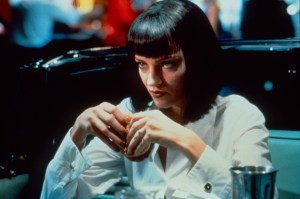Uma Thurman has been to Cannes more times than she can remember, either to pledge support for the glamorous annual charity event amfAR or with films as diverse as the genteel Merchant-Ivory period film The Golden Bowl (2000) and Quentin Tarantino’s ultraviolent Kill Bill: Volume 2 (2004), in which she reprised her badass role as The Bride. The film that propelled her to stardom, Pulp Fiction, won the Palme d’Or there, and Thurman hasn’t forgotten what it did for her. This year, she’s back with Paul Schrader‘s Oh, Canada, the kind of smart, character-based indie on which she earned her spurs.
DEADLINE: How did you get involved with Oh, Canada?
UMA THURMAN: Really, I just got the call through my agents to read a Paul Schrader script and meet with him. I’m so glad I did. I love Paul Schrader.
DEADLINE: Did you know him already?
THURMAN: No, I didn’t know him. I mean, I’ve certainly been in a room with him here or there. But no, I didn’t know him. Now I do, and I’m all the better for it.
DEADLINE: What grabbed you about it?
THURMAN: The script. I think it’s probably more clear filmed than it was on the page. It was such an unusual read. I mean, I’ve read some of the more unusual scripts that have been made in my lifetime, and this definitely was very, very unusual.
RELATED: Cannes Film Festival Photos Day 2: Meryl Streep, Faye Dunaway & ‘Furiosa: A Mad Max Saga’
DEADLINE: How would you describe it?
THURMAN: It’s a reverie of a man in the last moments of his life, reconstructing the narrative of what mattered to him, reevaluating who he is — and was — and the substance of a lifetime. But it’s also a very lyrical, sort of loosely knit, poetic, kind of dream-state illusion. So, written down, I found it more confusing than it is on the screen. The cinematic hand of Paul, of course, carried the day, as far as bringing this sort of illusionary dream together into something that you walk away from with the strong impression of a story.
Uma Thurman at the Cannes Film Festival
Rocco Spanziani/Archivio Spaziani/Mondadori Portfolio via Getty Images
DEADLINE: Is there anything you can tell us about your character?
THURMAN: I play a woman who has dedicated her life to documentary filmmaking. She married her professor, who’s played by Richard Gere. She went to work with him and found much success. So, she’s married to an older man that she passionately adores, and who’s dying of cancer. He’s sort of her mentor, partner, and husband rolled up into one. She’s being present there with him as he processes the end of his life. I don’t think there’s a spoiler alert about the fact that it’s the end of his life.
DEADLINE: What kind of shoot was it? It seems very intimate…
THURMAN: Well, just the presence of a master like Paul Schrader on a set of any size, is as distinct as, I don’t know, a warm wind. It’s like the wind that hits you when you get off a plane in the tropics. There’s only one thing of its ilk, and he’s kind of a master like that. You could really be anywhere; you can’t miss it.
RELATED: Cannes Film Festival 2024: All Of Deadline’s Movie Reviews
Watching him put this piece together, I had a very strong feeling that that this was very personal to him, knowing that he was very good friends with Russell Banks, the author of the book it’s based on. I forget exactly how it worked out, but I know the book was meant to be called Oh, Canada, but it was published, at least in North America, as Foregone, I believe. You can fact-check me [laughs]. I think I’m right, but I’m not pigheaded about rightness.
But anyway, there was something very sweet, and sad, and beautiful about their friendship; Russell and Paul were very enmeshed, intertwined, close friends. I believe this was the last book that Russell Banks wrote, as he himself was kind of going through, or into the window of, a similar period of his own life and end of life. I wouldn’t be able to say whether Paul would call him a best friend, or one of his best friends, or one of his closest friends, but, to me, it felt like a dear friend expressing the last work of a very dear friend contemplating a life in fiction. That’s a long explanation, but I think that, to me, is what was very beautiful about it.
DEADLINE: What kind of discussions did you have with Paul about the movie? It seems there’s a lot to debate there, a lot to talk about.
THURMAN: Oh, I wouldn’t be able to vaguely answer that. I read the book, and talked to Paul, and kind of understood his feelings about the author. I didn’t find that there were things to debate with him about it, really. It’s one man writing about another man’s lived experience, told in a fictitious narrative.
DEADLINE: It’s interesting, though, that it’s about a documentary filmmaker who’s debunking his own myths. It’s about getting at the truth and asking, what even is the truth? Your character says at one point, “I know everything I need to know.” What does that mean, to you, in terms of that idea of reality versus filmed reality?
THURMAN: Well, I think that, for that character, maybe there’s an underlying theme, an idea that there are truths, and then there are many facts, and sometimes facts can be contradictory, but there are still perhaps some higher truths that remain unabused by even conflicting facts. I think the character of the wife saying, “I know everything I need to know,” is her way of saying, “Yes, there’s tons of contradiction, but I know that I am loved, and I do love, and I was loved.” So, her confidence in this greater truth doesn’t mean… It means she’s unbuffeted by the things that contradict it, the facts. [Pause]. Perhaps.
DEADLINE: Had you worked with Richard Gere before?
THURMAN: With Richard? In 1991, when I was a kid, I played Kim Basinger’s younger sister in a movie called Final Analysis.

Thurman in Pulp Fiction.
Miramax/Everett Collection
DEADLINE: But you hadn’t worked together since then?
THURMAN: No, no. So that’s funny. It was a very beautiful cast. There’s Michael Imperioli, who’s great. We went to go see his Broadway debut last night, Enemy of the People. Basically, Paul does attract very inspired and inspiring people. He has very good taste.
DEADLINE: In people or in material?
THURMAN: In all things. His legacy is basically one of the main vertebrae of the backbone of American cinema.
DEADLINE: He never makes the same thing twice. Well, he does sometimes make similar films, but he doesn’t rest on his laurels. Do you have a particular favorite of his?
THURMAN: I don’t know. We were talking about Cat People last night.
I think the fact that he doesn’t really make the same film twice is probably why he has a 50-year career. You can’t make the same film over and over. You can’t pass multiple generations the same cup of tea, per se. So, I think it is his great depth of knowledge and his incredibly examining mind of the human spirit. He is quite special.
DEADLINE: What’s next for you?
THURMAN: I’m going to Cannes, and, after that, I don’t know. When everyone was on strike, I just kind of cooled my jets down. I haven’t figured out yet what I’m going to do next.

Read the digital edition of Deadline’s Disruptors/Cannes magazine here.
DEADLINE: Are you looking forward to Cannes? You must have been quite a few times now.
THURMAN: I have.
DEADLINE: It’s been 30 years since Pulp Fiction. What are your memories of that occasion?
THURMAN: Oh, it was extraordinary. I wish I had been there. I was shooting something else, so I wasn’t there when it won. That’s a real sadness and a regret, that I wasn’t able to be there when it won.
DEADLINE: What would you say Cannes means to you?
THURMAN: It’s really special. I mean, I’ve had so many films play in the festival. I don’t remember how many were in the competition or had premieres there, I’ve lost track, but I think it’s one of the most special film gatherings remaining in the world, if not the most special.

